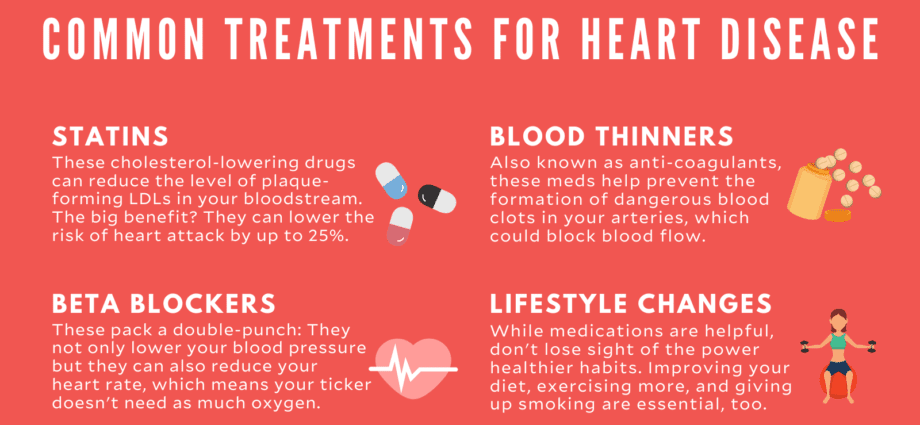Turinys
Medical treatments for heart problems, cardiovascular diseases (angina and heart attack)
Gydymas a miokardinis infarktas requires medical intervention fromskubumas in order to limit the consequences. Contact medical help as soon as possible. |
Emergency treatments offered at the hospital will not be discussed here. Once the emergency is under control, the therapeutic interventions The main aim will be to prevent the problem from getting worse and to prevent recurrence.
If you experience symptoms of angina attack, discuss it with a doctor without delay.
vaistai
The following drugs are used to treat or prevent angina attacks ir užkirsti kelią recurrent infarction.
- Hypolipémiants, to lower cholesterol levels: statins, bile acid binders, etc.
- Antiangineux, to treat coronary heart disease: beta blockers, calcium channel blockers, nitrates.
- Antitrombocitiniai vaistai : acetylsalicylic acid (aspirin) and clopidogrel.
Researchers are working to create molecules capable of raising the level of good cholesterol (HDL).
intervencijos
Depending on the case, one or the other of the following interventions may be indicated in order to prevent recurrent infarction.
- Percutaneous coronary intervention. This intervention, performed by an interventionist cardiologist, consists first of inserting a catheter fitted with an inflatable balloon to unclog a blocked artery, which is called theangioplastika. The catheter is inserted into an artery in the wrist or groin.
At the time of the operation, a small metal stake, or stent, is frequently inserted into the artery, which halves the risk of the artery becoming blocked again. To increase their effectiveness, some stakes are coated with a drug (for example, sirolimus or paclitaxel).
- Bypass surgery. The surgeon grafts a blood vessel, taken from a leg or chest, to create a new passage for blood to bypass a blockage in a coronary artery. Doctors opt for bypass surgery when several coronary arteries are blocked or narrowed, or when the main coronary artery is affected. This intervention takes place especially in the event of diabetas orŠirdies nepakankamumas, or if several blood vessels are blocked.
svarbus. Percutaneous coronary intervention and coronary bypass surgery are not quick fixes that solve all problems. Many people believe, neteisingai, that such interventions are enough to put them out of danger and allow them to resume their old habits of life. |
Gyvenimo būdo pakeitimas
Doctors are increasingly emphasizing the need to change lifestyle habits in order to slow or stop the progression of the disease, as explained in the Prevention section:
- nerūkyti;
- to exercise;
- eat well;
- išlaikyti sveiką svorį;
- have a good sleep;
- learn to relax;
- expressing emotions, etc.
Does the heart attack affect the heart, but also the brain and sleep? Problemosnemiga are common for 2 weeks after a heart attack. Experts have long believed that stress is the cause. However, it could be that the infarction affects not only the heart, but also neurons in the brain that play a role in sleep. At least this is a hypothesis supported by Quebec researchers.48. |
Šios gydymo centrai in cardiology now offer counseling services in matters of nutrition, physical exercise programs, support programs to quit smoking, relaxation workshops, stress management, meditation, etc.
These measures have both preventive and curative value.
Learn from the Mediterranean diet
Several cardiologists recommend this diet, which is effective for užkirsti kelią pasikartojimui.
Studies have shown that the Mediterranean diet manages to reduce 70% risk of recurrence of coronary heart diseasecompared to a balanced diet34-36 .
The Mediterranean diet is characterized in particular by an abundance of fresh vegetables and fruits, the use of olive oil as a source of fat, the consumption of fish and also of wine, in moderate quantities.
Psichoterapija
Undergoing psychotherapy as part of the treatment of cardiovascular disorders – or even better, in prevention – can bring many benefits39, 55. Chronic stress, anxiety, social isolation and aggression are all factors that, without being noticed, act on our nervous system and undermine our cardiovascular health. In addition, to alleviate these problems, it is common that we resort to behaviors which, instead of helping us, worsen the problem: smoking, alcoholism, compulsive eating, etc.
In addition, people who, after an angina attack, for example, are encouraged to rethink their gyvenimo būdas (exercise, quit smoking, etc.), have an interest in taking all possible means to achieve it. In any case, psychotherapy can play a leading role.










